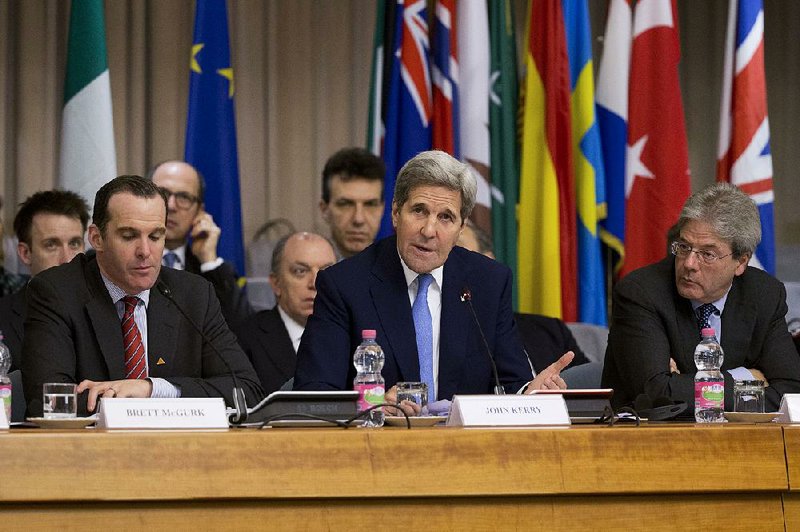ROME -- The military strategy for eliminating the Islamic State in Libya appeared on hold Tuesday as nations fighting the extremist group said they could help the North African country re-establish security once its long-awaited new government is established.
RELATED ARTICLES
http://www.arkansas…">Sides cite hurdles to Syria talks http://www.arkansas…">Obama seeking more funds to foil an 'aggressive' Russia
But Libya is in political crisis, more than four years after a U.S.-led military effort helped topple dictator Moammar Gadhafi. Neither the U.S. nor anyone else at a 23-nation conference in Rome spoke of a second military intervention.
Although much of the conference focused on anti-Islamic State efforts in Syria and Iraq, the concluding statement of foreign ministers also noted the Islamic State's "growing influence" in Libya. And U.S. Secretary of State John Kerry issued his own warning, saying "the last thing in the world you want is a false caliphate with access to billions of dollars of oil revenue." He called for more security training and undefined military support for Libya.
Since 2014, Libya has been split between two rival authorities. A new unity government still doesn't have parliamentary approval. And an Islamic State affiliate is carving out territory in the center of Libya while militants, wearied by coalition airstrikes in Iraq and Syria, flock to the new front.
Despite increased alarm, the U.S. and the European and Arab countries only resolved at Tuesday's meeting to "continue to monitor closely developments there, and stand ready to support the Government of National Accord in its efforts to establish peace and security for the Libyan people."
Kerry indicated political progress might be occurring behind the scenes, describing Libya as "on the brink of getting a new government" after months of waiting. But at a news conference later in the day, Kerry sidestepped a question that specifically concerned military strategy in Libya by focusing mainly on Syria and on President Barack Obama's determination not to build a significant U.S. military troop presence anywhere.
The meeting in Rome comes days after Obama convened a National Security Council meeting dedicated to Libya. U.S. Defense Secretary Ashton Carter also warned that Islamic State militants, also known as ISIS, were consolidating there by establishing training sites, attracting foreign recruits and raising tax money.
European countries, too, are weighing options, and Kerry won support from the meeting's host, Italian Foreign Minister Paolo Gentiloni. Italy, whose southernmost point is less than 300 miles from Libya, is the point of entry for hundreds of thousands of migrants using Libya-based smugglers to reach Europe.
Appearing alongside Kerry, Gentiloni said Italy would provide security assistance once Libya's government is confirmed and makes the appropriate request. He said "many countries" were working up such plans, but "we need a political process" first. France and Britain seem to have similar reservations.
In Washington, a key lawmaker said Western countries shouldn't wait.
"I don't think we can afford at this time to put off actions that might interrupt [the Islamic State's] operational capabilities" in Libya, said Rep. Adam Schiff, the House Intelligence Committee's top Democrat.
Tuesday's conference in Rome ended with similarly vague pledges to accelerate the Islamic State's defeat in Syria and Iraq.
Gentiloni said the Islamic State has lost 40 percent of the land it once held in Iraq, and 20 percent in Syria.
And Kerry cited the coalition's achievements over the past 16 months: 10,000 airstrikes, 90 leading militants killed, oil sites targeted, finances disrupted, most of the Turkish border sealed off, and heavy weapons, training sites and infrastructure all hammered by the U.S.-led campaign.
Neither outlined any new military steps from any coalition member, and there was no indication when the fight would move to the key Iraqi city of Mosul or the Islamic State's self-proclaimed capital in Raqqa, Syria.
In Washington, Carter said he'll lay out a plan to allies in Europe next week for intensifying the military campaigns in Iraq and Syria, and solicit new contributions. The plan includes Mosul's and Raqqa's recapture.
"I'm going to say, 'OK, guys, let's match up what is needed to win with what you have,' and give everybody the opportunity to make an assignment for themselves," he told reporters.
Information for this article was contributed by Robert Burns and Deb Riechmann of The Associated Press.
A Section on 02/03/2016

